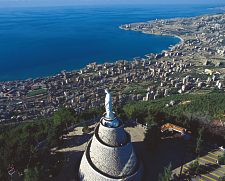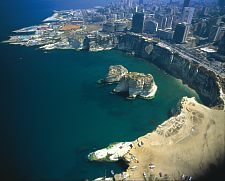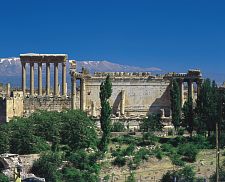|













| |
This page reports documentaries relevant to the cause of Democracy in Lebanon.
PDF files requires Adobe Reader to open. To download it for
FREE click
DOWNLOAD.
DOCUMENTARIES:
The Israel Lobby and U.S. Foreign Policy (PDF)
A Faculty Research Working Paper written by John J. Mearsheimer and Stephen
M. Walt and published by Harvard University, the John F. Kennedy School of
Government. March 2006
Synopsis: U.S. foreign policy shapes events in every corner of the globe.
Nowhere is this truer than in the Middle East, a region of recurring instability
and enormous strategic importance. Most recently, the Bush Administration’s
attempt to transform the region into a community of democracies has helped
produce a resilient insurgency in Iraq, a sharp rise in world oil prices, and
terrorist bombings in Madrid, London, and Amman. With so much at stake for so
many, all countries need to understand the forces that drive U.S. Middle East
policy.
The U.S. national interest should be the primary object of American foreign
policy. For the past several decades, however, and especially since the Six Day
War in 1967, the centerpiece of U.S. Middle East policy has been its
relationship with Israel. The combination of unwavering U.S. support for Israel
and the related effort to spread democracy throughout the region has inflamed
Arab and Islamic opinion and jeopardized U.S. security.
This situation has no equal in American political history. Why has the United
States been willing to set aside its own security in order to advance the
interests of another state? One might assume that the bond between the two
countries is based on shared strategic interests or compelling moral
imperatives. As we show below, however, neither of those explanations can
account for the remarkable level of material and diplomatic support that the
United States provides to Israel.
Instead, the overall thrust of U.S. policy in the region is due almost entirely
to U.S. domestic politics, and especially to the activities of the “Israel
Lobby.” Other special interest groups have managed to skew U.S. foreign policy
in directions they favored, but no lobby has managed to divert U.S. foreign
policy as far from what the American national interest would otherwise suggest,
while simultaneously convincing Americans that U.S. and Israeli interests are
essentially identical.
In the pages that follow, we describe how the Lobby has accomplished this feat,
and how its activities have shaped America’s actions in this critical region.
Given the strategic importance of the Middle East and its potential impact on
others, both Americans and non-Americans need to understand and address the
Lobby’s influence on U.S. policy.
Some readers will find this analysis disturbing, but the facts recounted here
are not in serious dispute among scholars. Indeed, our account relies heavily on
the work of Israeli scholars and journalists, who deserve great credit for
shedding light on these issues. We also rely on evidence provided by respected
Israeli and international human rights organizations. Similarly, our claims
about the Lobby’s impact rely on testimony from the Lobby’s own members, as well
as testimony from politicians who have worked with them. Readers may reject our
conclusions, of course, but the evidence on which they rest is not
controversial.
The Eurasian Heartland: A continental perspective on
Y-chromosome diversity (PDF).
The nonrecombining portion of the human Y chromosome
has proven to be a valuable tool for the study of population history. The
maintenance of extended haplotypes characteristic of particular geographic
regions, despite extensive admixture, allows complex demographic events to be
deconstructed. In this study we report the frequencies of 23 Y-chromosome
biallelic polymorphism haplotypes in 1,935 men from 49 Eurasian populations,
with a particular focus on Central Asia. These haplotypes reveal traces of
historical migrations, and provide an insight into the earliest patterns of
settlement of anatomically modern humans on the Eurasian continent. Central Asia
is revealed to be an important reservoir of genetic diversity, and the source of
at least three major waves of migration leading into Europe, the Americas, and
India. The genetic results are interpreted in the context of Eurasian linguistic
patterns. (Courtesy of PubMed Open Source, the National Institutes of Health,
USA.)
Who Were the Phoenicians?
We know they dominated sea trade in the Mediterranean for
3,000 years. Now DNA testing and recent archaeological finds are revealing just
what the Phoenician legacy meant to the ancient world—and to our own. (Courtesy
of National Geographic).
Democracy in Lebanon: Anatomy of a Crisis
To understand the crisis of democracy in Lebanon, it may be important to go back
to the roots of our democratic experiment rather than merely analyze, ex-nihilo,
its present malfunctioning. An article by Ghassan Tuéni, published in the
Beirut Review, Fall of 2003 by the Lebanese Center for Policy Studies.
|